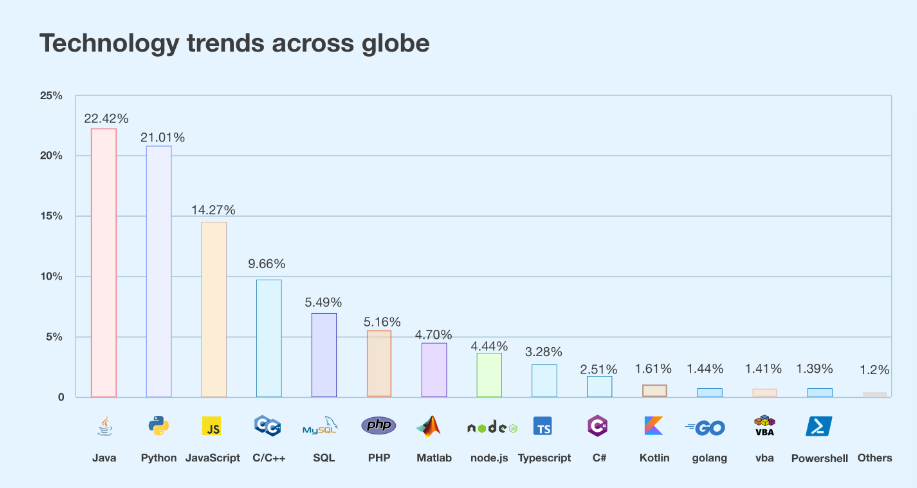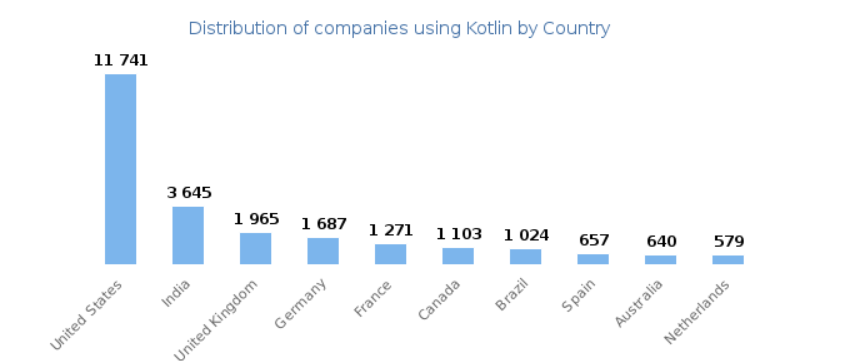
Why Kotlin: An intelligent choice for cross-platform development?
Cross-platform development has emerged as a game-changer in the ever-evolving landscape of software development, enabling developers to build applications that run seamlessly across multiple platforms. With an array of programming languages, why kotlin has become an intelligent choice for cross-platform development? To know the secrets behind Kotlin’s growing popularity, why Kotlin is better than any other cross-platform tool in many aspects, and more we have this blog post for you.
Kotlin Multiplatform: The Secrets Behind its Soaring Popularity
Kotlin’s Satisfaction rate by users is 86% based on the survey report by JetBrains.

Image Source: JetBrains
Developers worldwide are getting attracted to Kotlin Multiplatform’s power and versatility
Why is it so?
Explore why Kotlin is becoming a favorite programming language for coders, and how it can take your project to new heights.
The reasons –
Streamlined Development Process:
- With Kotlin Multiplatform, developers can write code seamlessly on various platforms, including Android, iOS, and web applications. It accelerates development and boosts productivity by eliminating the need for separate codebases.
- Sharing business logic, data models, and networking code across platforms ensures consistency, saving time and effort.
Seamless Integration into Existing Codebases:
- What sets Kotlin Multiplatform apart is its seamless integration with existing codebases, including Java and Objective-C. Migrating to Kotlin becomes a smooth transition, enabling developers to leverage the benefits without disrupting ongoing development.
Expressive and Safe Code:
- Kotlin’s concise syntax and powerful features make code more readable and maintainable. Its robust null-safety system reduces runtime crashes, enhancing overall code quality and stability.
Thriving Ecosystem and Community Support:
- Kotlin Multiplatform benefits from a vibrant ecosystem of libraries and tools catering to various development needs. These resources expedite development, covering networking, databases, and user interfaces.
- A collaborative community of Kotlin Multiplatform developers actively contributes to its growth. Online forums, documentation, and open-source projects provide valuable support and foster knowledge-sharing.
Top Programming Languages Developers Prefer in 2023

Image Source: SIMFORM
With Google now supporting Kotlin as a preferred language, its popularity is expected to increase hugely in coming years.
Reasons to Use Kotlin
So, why Kotlin?
Here are some compelling reasons to justify it.
- Cross-platform compatibility: Kotlin can run on multiple platforms, including Android, iOS, and the JVM, allowing developers to write code once and deploy it across different platforms.
- Interoperability with Java: Kotlin seamlessly integrates with Java, enabling developers to leverage existing Java code and libraries in their Kotlin projects.
- Concise syntax: Kotlin’s concise and expressive syntax reduces boilerplate code, making the codebase more readable and maintainable.
- Null safety: Kotlin’s invalid safety features prevent standard null pointer exceptions, producing more robust and reliable code.
- Strong tooling support: Kotlin has a rich ecosystem of tools and IDE support, including Android Studio, which enhances developer productivity.
- Growing community: Kotlin has a rapidly expanding community of developers, providing a wealth of resources, libraries, and support for developers.
- Performance: Kotlin offers similar performance to Java as it compiles to bytecode, ensuring efficient execution of code.
- Adoption rate: Kotlin has seen significant adoption in recent years, with numerous companies and developers embracing it for cross-platform development.
Why is Kotlin Multiplatform better than any other cross-platform tool?
Regarding cross-platform development, Kotlin stands out as the undisputed champion. Check out what makes Kotlin Multiplatform superior to any other cross-platform tool –
Unmatched Versatility:
- Kotlin Multiplatform is a game-changer for cross-platform development, offering unparalleled versatility. With Kotlin Multiplatform, developers can seamlessly target Android, iOS, and web platforms, eliminating the need for separate codebases and reducing development efforts.
Full Native Performance:
- Empowers developers to achieve full native performance on each platform.
- By sharing standard code while generating platform-specific code, Kotlin Multiplatform ensures optimal performance, delivering native-like experiences across platforms.
Enhanced Code Sharing:
- The code-sharing capabilities of Kotlin Multiplatform are simply unmatched.
- Developers can share business logic, data models, and networking code across platforms, maximizing code reuse and reducing maintenance overhead.
Seamless Integration:
- Kotlin Multiplatform seamlessly integrates with existing codebases, making adopting it a breeze.
- Integration with Java, Objective-C, and Swift codebases allows for a smooth transition to Kotlin, leveraging existing resources and expertise.
Robust Ecosystem:
- The Kotlin ecosystem offers various libraries and tools designed explicitly for multiplatform development. Among these are serialization libraries, networking frameworks, dependency injection frameworks, and UI libraries.
- In addition to the libraries and tools, the Kotlin community is vibrant and active. Developers can easily find tutorials, sample codes, and online forums where they can seek assistance and share knowledge.
Some of the Notable Brands Choosing Kotlin Multiplatform
Companies across various industries have recognized the advantages of adopting Kotlin Multiplatform for their software development needs.
Here are a few notable brands that have embraced Kotlin Multiplatform and why they have chosen it:
1.Uber: the renowned ride-sharing company Uber adopted Kotlin Multiplatform to streamline its development process and enhance code sharing between Android and iOS platforms. With Kotlin Multiplatform, Uber can write shared business logic in Kotlin, resulting in improved efficiency and faster time to market.
2.Pinterest: the popular visual discovery platform leveraged Kotlin Multiplatform to develop and maintain a consistent user experience across multiple platforms. By sharing code between Android and iOS, Pinterest reduced duplication efforts and achieved faster feature delivery.
3.Square: Square, the payment processing company, turned to Kotlin Multiplatform to optimize its development efforts and increase code reuse. With Kotlin Multiplatform, Square engineers can share code for core functionalities, saving time and effort while ensuring a consistent user experience.
4.Netflix: Kotlin Multiplatform has also caught the attention of Netflix, the leading streaming service. Netflix utilized Kotlin Multiplatform to create shared libraries, enabling seamless integration between its backend and mobile apps. This approach enhances productivity and allows for faster iterations in feature development.
These notable brands have chosen Kotlin Multiplatform because it facilitates code sharing, enhances development efficiency, and delivers a consistent user experience across different platforms.
Additionally, Fintech companies are becoming interested in Kotlin, which is well suited for building new age financial applications. American Express, Square, Capital, J.P. Morgan and Goldman Sachs are some of Fintech players preferring Kotlin.
FAQs
Q1. Why must my business consider using Kotlin Multiplatform?
Kotlin Multiplatform offers code sharing, faster development, cost savings, improved app performance, and seamless integration with existing codebases.
Q2. Can I use Kotlin Multiplatform for Android and iOS app development?
Kotlin Multiplatform supports Android and iOS platforms, allowing code sharing between projects.
Q3. Is Kotlin Multiplatform suitable for large-scale enterprise applications?
Yes, Kotlin Multiplatform is well-suited for large-scale enterprise applications. Its code-sharing capabilities, performance, and ease of maintenance make it an attractive choice for businesses of all sizes.
Q4. Does Kotlin Multiplatform support other platforms besides Android and iOS?
Yes, Kotlin Multiplatform is highly adaptable and can be used on various platforms, including JVM, macOS, Windows, and Linux. It allows code sharing across multiple platforms, increasing development efficiency.
Q5. What are the key features of Kotlin Multiplatform?
Kotlin Multiplatform offers a range of essential features for cross-platform development:
- Common code modules
- Interoperability with existing code
- Cross-platform libraries
- Access to platform-specific APIs and frameworks
- Multiplatform projects
Q6. Why is Kotlin beneficial for cross-platform development?
Kotlin Multiplatform brings several advantages to cross-platform development:
- Shared Code
- Unified Development Environment
- Library Consistency
- Code Reusability
Q7. What are the limitations of Kotlin?
Here are some limitations of Kotlin-
- Slower compilation speed compared to Java.
- Limited tooling and community support compared to Java.
- Hiring can be difficult
Conclusion
To summarize, businesses looking for efficient cross-platform development must choose Kotlin for its powerful features and capabilities. With Kotlin Multiplatform, companies can reduce costs, save development time, and ensure platform consistency. That’s why Kotlin is an intelligent choice for modern cross-platform development.
If you want to leverage the benefits of Kotlin for your business, we’re here to help. Contact us today for expert consultation and development services, and take advantage of Kotlin’s powerful capabilities for your next project.
Share this post
About the Author

Sujoy Roy
(Head – Digital Marketing)
From my teenage time, I had a quench to solve problems and loved leadership. Starting my career in relation management, ignited my passion for managing people. While managing I realized technology needs to be incorporated to keep pace with the changing world & do my work efficiently.


